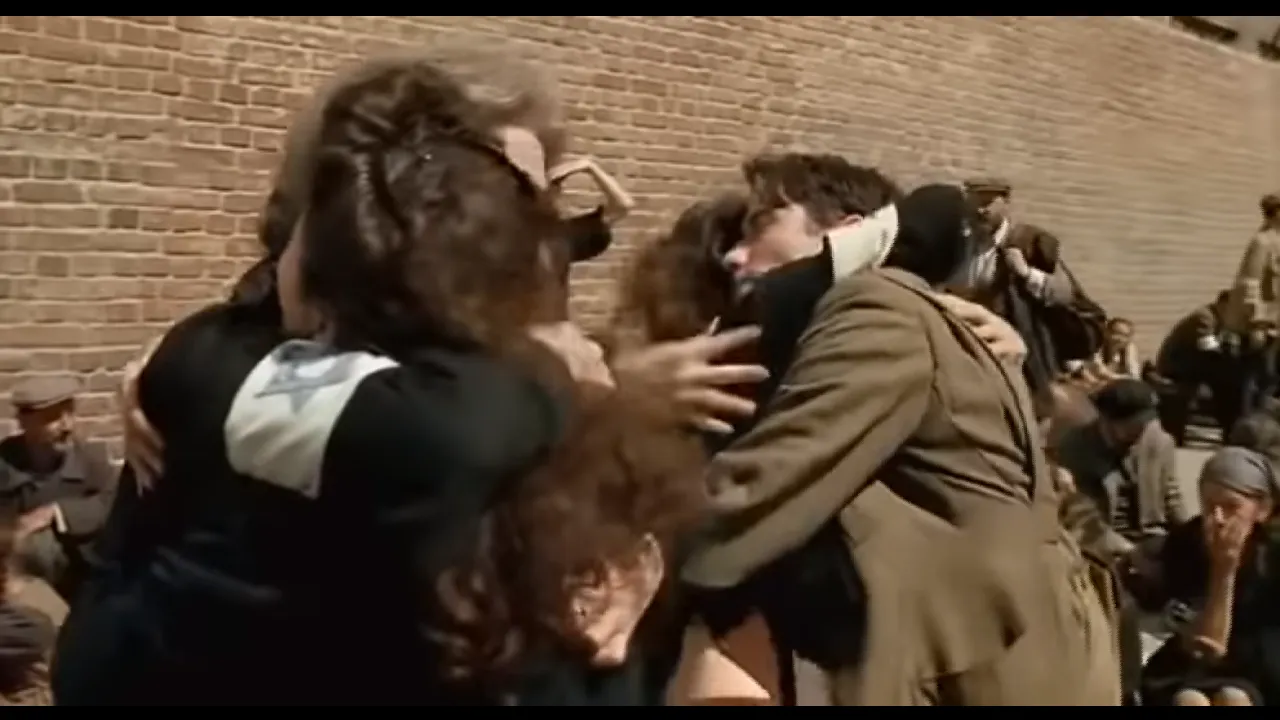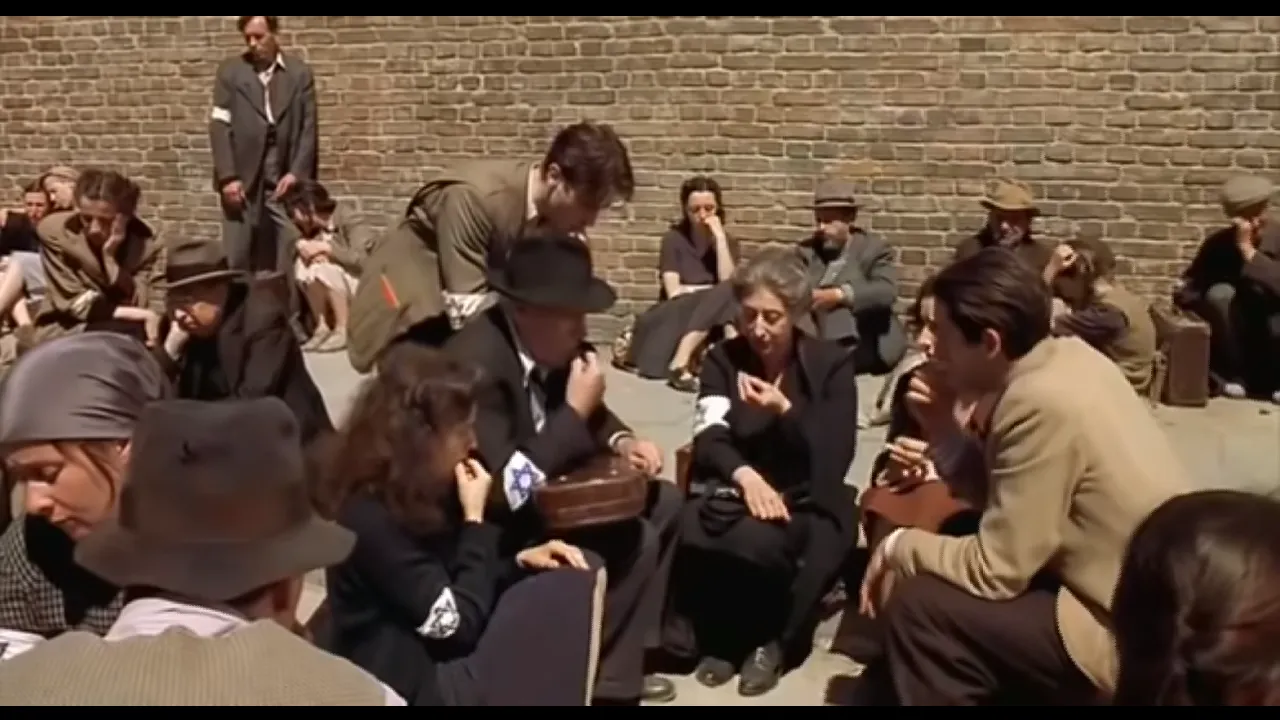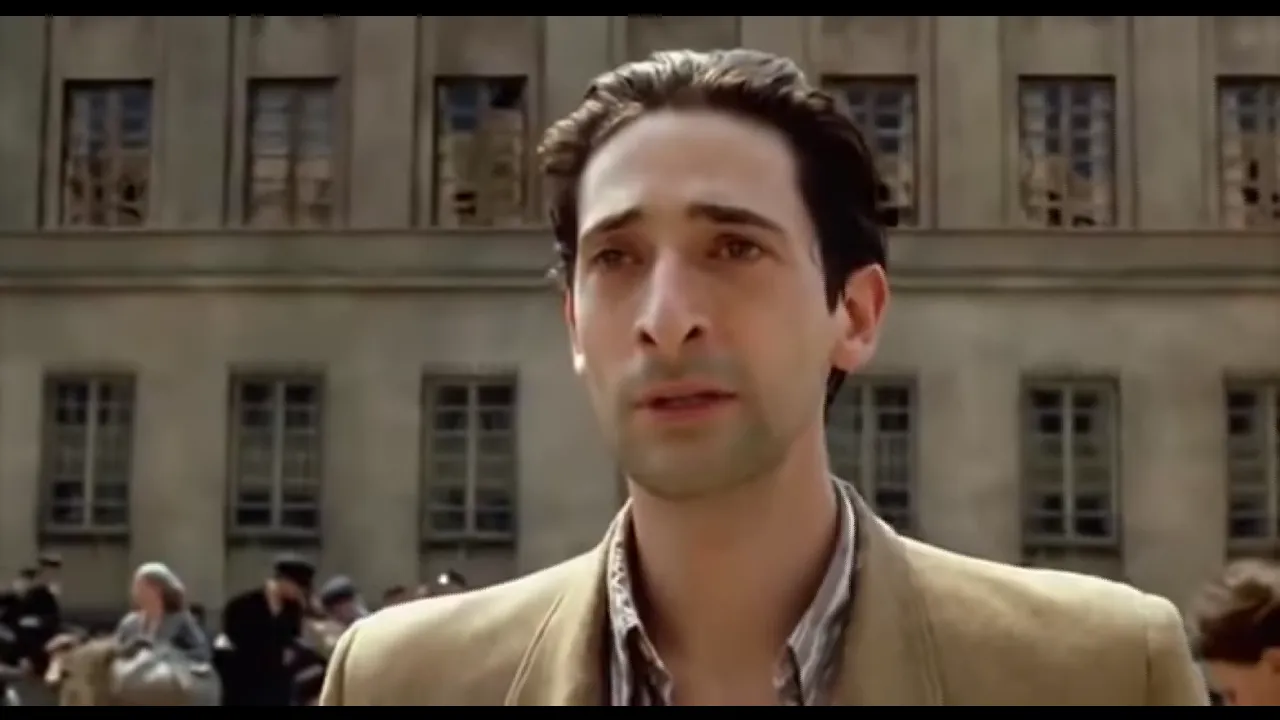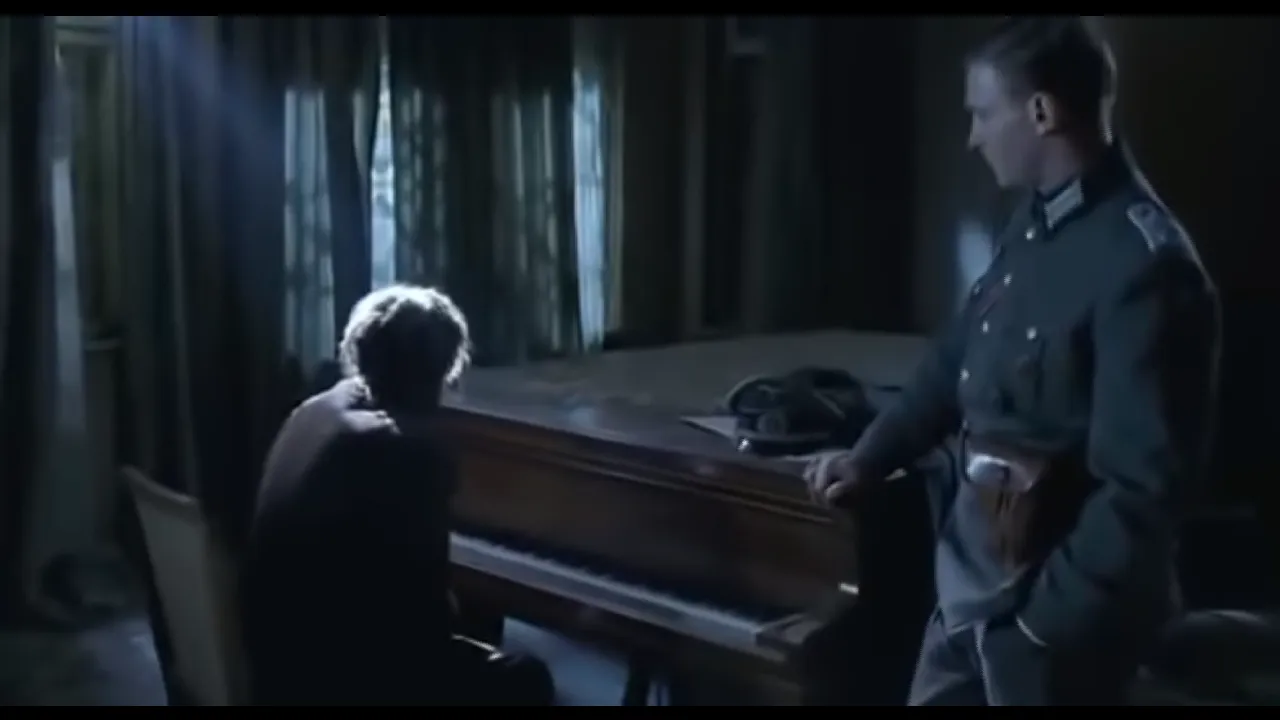Hola queridos amigos de @holos-lotus, aunque ya la iniciativa que motivaba a presentar nuestras impresiones de la película "El pianista" pasó, ahora que finalmente pude verla deseo me permitan platicarles lo que pude aprender de esta para mi crecimiento personal, mi reflexión, pero también lo que indague sobre historia, ya que siendo un hecho real la misma me dejó con incógnitas sobre quien era el militar Hosenfeld que ayudó al Pianista y su destino, así que busqué sobre él y tengo mi humilde opinión de porqué era diferente a los demás militares. No sé si ustedes sintieron la misma curiosidad que yo al verla.
Esta película nunca la había visto, pero leyendo las intervenciones e impresiones de muchos acá sobre la misma me sentí motivada a verla y no quedé defraudada, hay mucho aprendizaje para la vida presente, comenzando por la familia de Szpilman, hermosa familia.

Esta hermosa familia experimentó los horrores de la Alemania Nazi, no encuentro explicación racional al odio desmedido hacia una raza en particular, lo que el prejuicio puede hacer. Esta noble familia al igual que muchas familias judias fueron victimas del holocausto, el exterminio a una nación por su origen. Los Alemanes consideraban a los judios como una raza inferior, su sangre fue menospreciada y la finalidad era erradicarlos de la faz de la tierra, cuánto dolor, miseria y muerte. Les confieso que en varias escenas volví mis ojos para no ver y sé que la realidad fue aún peor. Para la familia de Szpilman fue deseperante ver como mermaron sus recursos y desmejoraron notablemente sus vidas, pero nunca, nunca perdieron su esencia, sus valores, aún en medio de la guerra. Hubo unidad, amor, fidelidad, lealtad de unos a otros.
Recuerdan la escena en que parten un caramelo para los 6? Todos igual, juntos, unidos en la angustia. Es en los momentos difíciles cuando debemos sacar lo mejor de nosotros, no perder nuestra esencia, en la escasez, la enfermedad, es cuando la familia debe estar más unida. Ellos no dejaron de ser ellos, su esencia, la belleza de su compromiso familiar estuvo siempre presente.

Muchos judios fueron llevados al Gueto de Varsovia y estaban allí por un tiempo luego los transladaban a un campo de concentración para ser exterminados, allí llevaron a la hermosa familia de Szpilman... El pianista se salvó de la misma suerte por la intervención de un amigo suyo que le sacó de la fila. El pianista tampoco perdió su esencia, su nobleza, el trabajo duro le fue muy difícil y es que en esencia el era un pianista. Sus dedos estaban acostumbrados al arte, la música y aún en medio del hambre y la miseria no olvidó lo que era, un pianista.

Como músico tenía muchos amigos polacos que no eran de origen judio y por supuesto estaban en desacuerdo con el genocidio contra los judios, así como también contra el dominio de los Alemanes al territorio de Polonia. Estos amigos mostraron solidaridad, pero no fue mucho lo que pudieron hacer. Szpilman, quedó sólo con hambre, sed, enfermo, escondido entre las ruinas, no era hombre de guerra, no luchaba con la resistencia aún cuando hizo algunos aportes, era pacifista, un músico. Estando en esa condición extrema de hambre y necesidad, buscando como sobrevivir, lo encuentra el capitán Hosenfeld. Si no fuese porque ya sabia que este le ayudaría por la lectura que hice a los escritos de otros usuarios me hubiese impresionado mucho por la suerte del pianista, ya que todos los que portaban los uniformes eran presentados como los malos, crueles en extremo. Pero este uniformado era diferente e hizo que Szpilman tocara el piano para el, qué era lo diferente en él?

El Capitan Hosenfeld no delató a Szpilman, le ayudó con alimentos y le alentaba con las noticias del fin de la guerra. Posteriormente se supo que ayudó no solo a Szpilman, también ayudó a rescatar y esconder otros polacos, incluyendo a judios, tal hecho es mencionado en distintas biografías que pude consultar. De su biografía llamó mi atención que mencionan su reputación de buen padre, en la película lo veo reflejado en la foto de su familia que tiene en el escritorio y que nos permiten ver con total claridad. Creo que no está allí por casualidad, sus 5 hijos dicen los relatos biográficos escogieron todos sus profesiones en el área de la medicina. También leí de sus creencias, su fe, era cristiano católico. Una declaración sobre el que leí en Wikipedia y llamó mi atención fue "que se le reprochaba su falta de compenetración con el nazismo debido a su cristianismo activo". De modo que no era simplemente un militar más, había un conocimiento en el que lo hacía ser distinto, diferente y después de su muerte pudo evidenciarse esto al leer las personas su diario personal, pudieron comprobar que era así por las ideas y pensamientos que escribia abrumado y condenando todo lo que estaba sucediendo en contra de los judios. Me gustó también saber que ejerció en algún momento de su vida como maestro rural, los niños nos enseñan muchas cosas.
Sabian ustedes que Israel rindió homenaje a Hosenfeld el 19 de junio de 2009?. Me gustó saberlo, fue en una ceremonia en Berlín, allí se le concedió el título de "Justo entre las naciones. Y saben quienes estuvieron presentes? Los hijos de Hosenfeld y Szpilman. Este título es muy importante y se le da a personas que no son judias, pero ayudaron a los judios. Aunque el murió en un campo de concentración soviético y en su momento no le creyeron que el era diferente, posteriormente la historia permitió dar justicia a su legado de humanidad. Aún en la guerra rodeado de tanta atrocidad por sus iguales el no perdió su esencia, sus valores. Inicialmente fue atraido por las ideas de Hitler, pero luego al ver el contraste con sus creencias no pudo dejar de ponerse del lado de lo justo aún cuando era un capitán,no cambió su esencia.
Hosenfeld, Szpilman y su familia nos enseñan a permanecer fieles a nuestras convicciones siempre sin importar las circunstancias, a no perder nuestra esencia y lo importante que es cultivar nuestro ser, cuidar nuestra mente y corazón, nuestros actos reflejan lo que hay en nuestro interior.
"El hombre bueno, del buen tesoro de su corazón saca lo que es bueno; y el hombre malo, del mal tesoro saca lo que es malo; porque de la abundancia del corazón habla su boca". (Lucas 6:45)
Saludos amigos, Dios les bendiga inmenso, gracias por leerme, abrazos.
Nota: El contenido es original, las fotos son captures de la película vista en Youtube, la traducción es hecha en Deepl. ❤️
❤️❤️❤️❤️❤️❤️❤️❤️❤️❤️❤️❤️❤️❤️❤️❤️❤️❤️❤️❤️❤️❤️❤️❤️❤️❤️❤️❤️❤️❤️❤️❤️❤️❤️❤️❤️
Hello dear friends of @holos-lotus, although the initiative that motivated us to present our impressions of the movie "The Pianist" has passed, now that I finally got to see it, I want to tell you what I could learn from it for my personal growth, my reflection, but also what I found out about history, since being a real fact, it left me with questions about who was the military Hosenfeld who helped the Pianist and his fate, so I searched about him and I have my humble opinion of why he was different from the other military men. I don't know if you guys felt the same curiosity as I did when watching it.
I had never seen this movie, but reading the interventions and impressions of many here about it I felt motivated to watch it and I was not disappointed, there is a lot of learning for the present life, starting with Szpilman's family, beautiful family.

This beautiful family experienced the horrors of Nazi Germany, I find no rational explanation for the unbridled hatred of a particular race, what prejudice can do. This noble family as well as many Jewish families were victims of the holocaust, the extermination of a nation because of its origin. The Germans considered the Jews as an inferior race, their blood was despised and the aim was to eradicate them from the face of the earth, how much pain, misery and death. I confess that in several scenes I turned my eyes away and I know that the reality was even worse. For the Szpilman family it was heartbreaking to see how their resources dwindled and their lives deteriorated, but they never, never lost their essence, their values, even in the midst of the war. There was unity, love, fidelity, loyalty to one another.
Do you remember the scene where they split a candy for the 6? All the same, together, united in anguish. It is in difficult times when we must make the best of ourselves, not to lose our essence, in scarcity, in sickness, is when the family must be more united. They did not stop being them, their essence, the beauty of their family commitment was always present.

Many Jews were taken to the Warsaw Ghetto and were there for a while then transported to a concentration camp to be exterminated, there they took Szpilman's beautiful family.... The pianist was saved from the same fate by the intervention of a friend of his who pulled him out of the line. The pianist also did not lose his essence, his nobility, the hard work was very difficult for him, because in essence he was a pianist. His fingers were used to art, music and even in the midst of hunger and misery he did not forget what he was, a pianist.

As a musician he had many Polish friends who were not of Jewish origin and of course disagreed with the genocide against the Jews, as well as the Germans' domination of Polish territory. These friends showed solidarity, but there was not much they could do. Szpilman, left alone, hungry, thirsty, sick, hiding in the ruins, was not a man of war, he did not fight with the resistance even though he made some contributions, he was a pacifist, a musician. In this extreme condition of hunger and need, looking for a way to survive, Captain Hosenfeld found him. If it wasn't for the fact that I already knew that he would help him from reading the writings of other users, I would have been very impressed by the fate of the pianist, since all those who wore the uniforms were presented as the bad guys, cruel in the extreme. But this uniformed one was different and made Szpilman play the piano for him, what was different about him?

Captain Hosenfeld did not betray Szpilman, he helped him with food and encouraged him with the news of the end of the war. Later it became known that he helped not only Szpilman, but also helped to rescue and hide other Poles, including Jews, which is mentioned in several biographies that I was able to consult. From his biography it caught my attention that they mention his reputation as a good father, in the film I see it reflected in the photo of his family that he has on his desk and that we can see with total clarity. I believe he is not there by chance, his 5 children say the biographical accounts all chose their professions in the medical field. I also read of his beliefs, his faith, he was a Catholic Christian. One statement about him that I read on Wikipedia that caught my attention was "that he was reproached for his lack of rapport with Nazism because of his active Christianity." So he was not just another military man, there was a knowledge in him that made him different, different and after his death this could be evidenced when people read his personal diary, they could see that this was so by the ideas and thoughts that he wrote overwhelmed and condemning everything that was happening against the Jews. I also liked to know that he worked at some point in his life as a rural teacher, children teach us many things.
Did you know that Israel paid tribute to Hosenfeld on June 19, 2009? It was a ceremony in Berlin, where he was awarded the title of "Righteous Among the Nations. And do you know who were present? The children of Hosenfeld and Szpilman. This title is very important and is given to people who are not Jewish, but helped the Jews. Although he died in a Soviet concentration camp and at the time was not believed to be different, history later allowed justice to be done to his legacy of humanity. Even in war surrounded by so much atrocity by his peers he did not lose his essence, his values. Initially he was attracted to Hitler's ideas, but then when he saw the contrast with his beliefs he could not help but take the side of righteousness even though he was a captain, he did not change his essence.
Hosenfeld, Szpilman and his family teach us to remain true to our convictions always no matter what the circumstances, to not lose our essence and how important it is to cultivate our being, to take care of our mind and heart, our actions reflect what is inside us.
The good man out of the good treasure of his heart brings forth that which is good; and the evil man out of the evil treasure brings forth that which is evil; for out of the abundance of the heart his mouth speaks" (Luke 6:45).
Greetings friends, God bless you immensely, thank you for reading me, hugs.
Note: The content is original, the photos are captures from the movie seen on Youtube, the translation is made in Deepl. ❤️